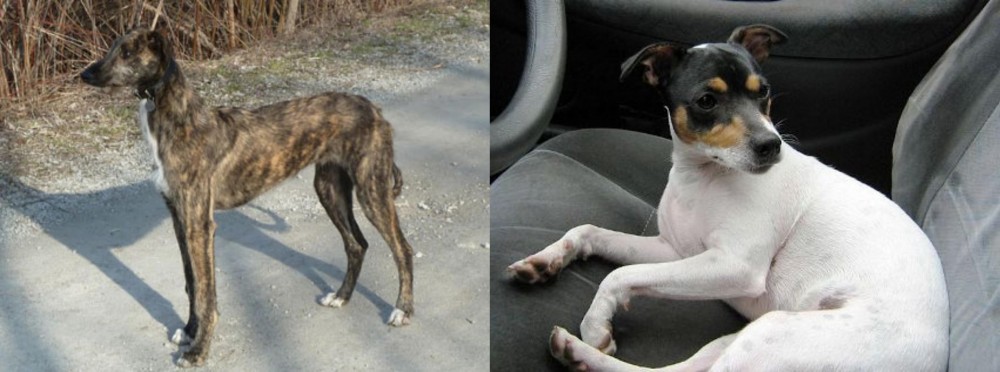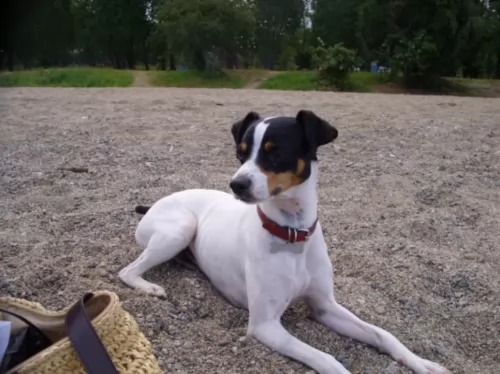 Petzlover
Petzlover American Staghound is originated from United States but Chilean Fox Terrier is originated from Chile. American Staghound may grow 37 cm / 15 inches higher than Chilean Fox Terrier. American Staghound may weigh 32 kg / 71 pounds more than Chilean Fox Terrier. Both American Staghound and Chilean Fox Terrier has almost same life span. Both American Staghound and Chilean Fox Terrier has same litter size. Both American Staghound and Chilean Fox Terrier requires Low Maintenance.
American Staghound is originated from United States but Chilean Fox Terrier is originated from Chile. American Staghound may grow 37 cm / 15 inches higher than Chilean Fox Terrier. American Staghound may weigh 32 kg / 71 pounds more than Chilean Fox Terrier. Both American Staghound and Chilean Fox Terrier has almost same life span. Both American Staghound and Chilean Fox Terrier has same litter size. Both American Staghound and Chilean Fox Terrier requires Low Maintenance.
 The American Staghound is hunting dog and type of sighthound that is not recognized as a separate breed. They have historically been bred to hunt coyotes and then other game. Even though they are not considered a separate breed some of their breeding lines have existed much longer than some officially recognized breeds. The American Staghound is a cross between the Greyhound and the Scottish Deerhound. There was probably some Borzoi mixed in as well. The Staghound is believed to have traveled with General Custer across the American West.
The breed is a long-legged running dog with the speed of a Greyhound, the sighting ability of sight hounds and more endurance than any running breed. They are incredible athletes with amazing agility and have been bred to course game – coyotes mostly – and therefore are bred with a very intense prey drive. In the past they chased stags and deer and today they chase coyotes and hare. Coyotes are much faster than wolves and fight just as hard. The American Staghound is the only breed fast enough to track down the coyote. However, the breed is not recognized by the AKC.
Hunting with an American Staghound today is not very different from hunting with them in medieval times. Strict breeding practices and the non-commercialization of the breed has led to the almost perfect preservation of this hunting breed. They have not changed very much over the centuries. They have been breeding Staghound to Staghound since the early 1800’s. At times very, good hunting dogs from Greyhound and Deerhound stock are added to the mix. For hundreds of years now the closed breeding has led to what might be the finest coyote chasing sighthound possible.
The American Staghound is hunting dog and type of sighthound that is not recognized as a separate breed. They have historically been bred to hunt coyotes and then other game. Even though they are not considered a separate breed some of their breeding lines have existed much longer than some officially recognized breeds. The American Staghound is a cross between the Greyhound and the Scottish Deerhound. There was probably some Borzoi mixed in as well. The Staghound is believed to have traveled with General Custer across the American West.
The breed is a long-legged running dog with the speed of a Greyhound, the sighting ability of sight hounds and more endurance than any running breed. They are incredible athletes with amazing agility and have been bred to course game – coyotes mostly – and therefore are bred with a very intense prey drive. In the past they chased stags and deer and today they chase coyotes and hare. Coyotes are much faster than wolves and fight just as hard. The American Staghound is the only breed fast enough to track down the coyote. However, the breed is not recognized by the AKC.
Hunting with an American Staghound today is not very different from hunting with them in medieval times. Strict breeding practices and the non-commercialization of the breed has led to the almost perfect preservation of this hunting breed. They have not changed very much over the centuries. They have been breeding Staghound to Staghound since the early 1800’s. At times very, good hunting dogs from Greyhound and Deerhound stock are added to the mix. For hundreds of years now the closed breeding has led to what might be the finest coyote chasing sighthound possible.
 The Chilean Fox Terrier, developed in Chile, is a dog breed which comes from crossing the British Fox Terrier with some of the local Chilean dogs.
The Chilean Fox Terrier, developed in Chile, is a dog breed which comes from crossing the British Fox Terrier with some of the local Chilean dogs.
The dog is thought to have been developed in the 19th century already, some time between 1790 and 1850.
The dog is known for its skills in catching rats and mice. Known also as the Chilean Rat Terrier, Terrier Chileno or Ratonero, the Chilean Fox Terrier hasn’t achieved formal recognition with any of the leading canine organizations.
 When you look at the American Staghound you can clearly see the Scottish Deerhound and the Greyhound lines. They have strong running muscles in their long legs and deep chest. He is of course a sight hound, so his vision is acute.
His running endurance is second to none. It is this endurance in running all day that makes the American Staghound difference from the Scottish Deerhound and the Greyhound. Yes, both the Deerhound are greyhound are great runners, but the American Staghound runs just as fast with an endurance level ten times that of the other hounds. His heavy bones structure and thick skin are also different from the other racing fast sight hounds.
When you look at the American Staghound you can clearly see the Scottish Deerhound and the Greyhound lines. They have strong running muscles in their long legs and deep chest. He is of course a sight hound, so his vision is acute.
His running endurance is second to none. It is this endurance in running all day that makes the American Staghound difference from the Scottish Deerhound and the Greyhound. Yes, both the Deerhound are greyhound are great runners, but the American Staghound runs just as fast with an endurance level ten times that of the other hounds. His heavy bones structure and thick skin are also different from the other racing fast sight hounds.
 The Chilean Fox Terrier looks almost identical to his ancestors. He stands between 30 – 40cm and weighs between 5 to 9kg.
The Chilean Fox Terrier looks almost identical to his ancestors. He stands between 30 – 40cm and weighs between 5 to 9kg.
He is squarely proportioned, he is athletic looking and well muscled with long, slender legs. Many of these dogs are born with naturally short tails, but if not, then the tail is usually docked after the first or second vertebrae. Now that docking is falling out of favor, the breed is losing that distinctive look.
The head of the Chilean Fox Terrier is triangular with the muzzle being somewhat shorter than the Smooth Fox Terrier. The ears of the Chilean Fox Terrier are smallish and high set, being partially erect. The coat of the dog is short and thick and essentially white while the face is usually tan and black.
The Chilean Fox Terrier is loyal with his human family and can fit in well with a family where there are children and other pets.
Training and socialization become necessary for the dog so that he becomes obedient and amicable around his family and with strangers. He isn’t an aggressive dog but he is alert and can make an excellent watch dog.
He is dominant and confident and also intelligent and easily trainable. He is an active dog so he will require exercise every day, whether he lives in the city or in the country.
 This dog was bred to run fast and long after something it sees. They are not considered hyperactive but won’t live well in a confined space such as an apartment or condo. You will need a single-family house with a large yard. Though they are affectionate, family dogs, they are not cut out to be guard dogs. They are not especially protective or territorial, though they may bark at what they can see in the distance.
They are calm in their homes if exercised enough and great with children. They are often gentle and loving. They are pack oriented and accept other dogs, but they are not welcoming toward cats or other prey sized animals. Be careful with the AS around small children as he might knock them down or see them as prey as well. They consider anything smaller that runs to be prey.
When chasing prey, they are not only fast and enduring, they are tenacious and courageous. Remember that this is a breed that has been bred true in order to hunt and only in order to hunt. Their hunting instincts will override almost any other. Over the centuries only the best hunters were allowed to be bred so that only the best hunters would be born.
This dog was bred to run fast and long after something it sees. They are not considered hyperactive but won’t live well in a confined space such as an apartment or condo. You will need a single-family house with a large yard. Though they are affectionate, family dogs, they are not cut out to be guard dogs. They are not especially protective or territorial, though they may bark at what they can see in the distance.
They are calm in their homes if exercised enough and great with children. They are often gentle and loving. They are pack oriented and accept other dogs, but they are not welcoming toward cats or other prey sized animals. Be careful with the AS around small children as he might knock them down or see them as prey as well. They consider anything smaller that runs to be prey.
When chasing prey, they are not only fast and enduring, they are tenacious and courageous. Remember that this is a breed that has been bred true in order to hunt and only in order to hunt. Their hunting instincts will override almost any other. Over the centuries only the best hunters were allowed to be bred so that only the best hunters would be born.
 The Chilean Fox Terrier is a lively dog with an alert expression. He has become a popular companion dog, being less aggressive than other Terriers.
The Chilean Fox Terrier is a lively dog with an alert expression. He has become a popular companion dog, being less aggressive than other Terriers.
When you treat him well he becomes a loyal friend and forms a strong bond with his human owners. He gets on well with children who have been taught to respect animals, but he tends to become a bit aggressive around other dogs of the same sex.
Socialization and training however can make him much more relaxed around other dogs.
He is an attractive little dog with his short coat, giving the appearance of being well groomed. He can adapt to country- or city life too. He is such an easy dog to keep too so why not choose him as your 4-legged family member? He promises to make the perfect family companion.
 The American Staghound has been bred so consistently within the breed and true that they exhibit very few health problems. All running dogs are susceptible to joint issues, but the Staghound has less than most. Two issues they do face more often are a problem with anesthesia if they ever need it and the propensity to be vulnerable to bloat. Since they are a centuries old hybrid there are no real health issues born of genetics.
The American Staghound has been bred so consistently within the breed and true that they exhibit very few health problems. All running dogs are susceptible to joint issues, but the Staghound has less than most. Two issues they do face more often are a problem with anesthesia if they ever need it and the propensity to be vulnerable to bloat. Since they are a centuries old hybrid there are no real health issues born of genetics.
 The Chilean Fox Terrier is a healthy breed who doesn’t appear to have any particular health issues. It doesn’t mean that your dog will be free from disease, but it is worth knowing that a quality diet, fresh water and lots of love and attention does enhance longevity in a pet.
The Chilean Fox Terrier is a healthy breed who doesn’t appear to have any particular health issues. It doesn’t mean that your dog will be free from disease, but it is worth knowing that a quality diet, fresh water and lots of love and attention does enhance longevity in a pet.
It is to your benefit to know about one or two common diseases that your dog could get.
You’ll notice your pet’s stomach being swollen. Bloat is a disease which can become dangerous because the stomach can twist. Once this happens, gas can’t escape from the stomach and your pet will want to vomit, he’ll salivate and you’ll notice unusual restless kind of behavior. You need to get him to the vet as soon as possible.
This is also a disease that any dog can develop and can be a complication of another pet disease such as Lyme disease. One of the first signs of kidney disease in dogs is drinking more often than usual and also urinating more often.
He’ll lose his appetite and be lethargic and likely lose weight. Kidney disease is a serious disease and you will need to get your pet to the vet as soon as possible.
 It is important that you don’t ever over feed you American Staghound as they are thin and bred to run. Even though they are heavier boned than their closest relatives, they are still very susceptible to obesity if overfed. The adult AS should be fed about 4-6 cups of dry food every day in at least 2 meals but 3 of more would be better. This will prevent bloat.
It is important that you don’t ever over feed you American Staghound as they are thin and bred to run. Even though they are heavier boned than their closest relatives, they are still very susceptible to obesity if overfed. The adult AS should be fed about 4-6 cups of dry food every day in at least 2 meals but 3 of more would be better. This will prevent bloat.
As previously mentioned there are no genetic issues with the health of the American Staghound. Bred for one reason and one reason alone for many centuries has led to this healthy state. Also, as stated previously they can have issues with bloat and anesthesia. The issue with anesthesia comes from the fact that the American Staghound has very little body fat to muscle ration. The issue with bloat or torsion can be avoided with many smaller meals and not running your Staghound right after they eat a large meal.
Of course, the American Staghound loves to run and if you are not going to hunt with her, you will have to find another source of vigorous physical activity. Every day from puppyhood on the AS must be stimulated mentally and physically in order to grow and mature correctly. He must have a home where the freedom to run is an everyday experience, not a dog park once a week. If you ride bikes, race walk or run on a daily basis this might be the dog for you. They obviously excel at games like lure coursing and can be good at agility.
 The Chilean Fox Terrier is a low maintenance breed and this means you won’t be having to part with any money on grooming sessions for him. He’ll basically require a brushing twice a week.
The Chilean Fox Terrier is a low maintenance breed and this means you won’t be having to part with any money on grooming sessions for him. He’ll basically require a brushing twice a week.
The Chilean Fox Terrier, as a smaller dog breed, will also require regular dental brushing, as neglecting this can result in dental problems as well as a host of diseases that are associated with gum disease and tooth decay.
Make sure to feed him a quality diet full of vitamins and minerals and ensure he always has fresh, cool water available.